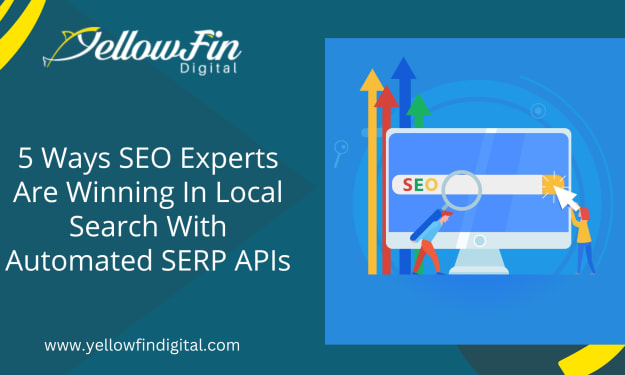The Ultimate Solution of Common SEO Mistakes to Avoid in 2023
Don't let your online visibility suffer due to common SEO mistakes. Here are a few of the most frequent errors and how to prevent them in just a few straightforward steps.

SEO can be tricky, and mistakes are common, even for experienced web admins. But it's important to know what not to do regarding SEO to ensure your website stands a chance against the big players.
One common mistake is poor markup, which can negatively impact your search engine rankings, regardless of how many backlinks you have. But don't fret; most of these SEO blunders are quick fixes that can be resolved quickly.
If search engines regularly crawl your website, you'll instantly see the changes. And if not, be patient because the benefits are worth the wait.
In this blog post, Austin SEO company experts will talk about the most common SEO mistakes and the solution to rectify them.
The 7 Most Common SEO Mistakes to Avoid
SEO Mistake 1: Nothing to Read
The Problem:
If you have stuffed an entire page with visuals or used development methods that are not friendly to crawlers, for instance, a purely flash-based website, the search engine will be unable to read your content. Not having any text on the page can severely impede its ranking.
No matter how wonderfully you craft your article with resplendent keywords, it will only be used if the search engines can recognize it. As a result, your keyword-laden content will have low visibility in SERPs - potentially hampering any chance of success.
The Solution:
To ensure your website is accessible to the Google crawler, use plain text instead of images for displaying critical names, content, or links. However, if you must use visuals for textual information, consider adding a few words under the ALT attribute as descriptive text.
Furthermore, the experts with an SEO company in Austin recommend always opting for text on your website rather than visuals. Although it may be referred to as "plain" text, this does not mean it has to look plain or boring. Instead, you can create a visually stunning website and ensure search engines can crawl through your content effectively -- the best of both worlds.
SEO Mistake 2: Nondescript URLs
The Problem:
Have you ever written a fantastic webpage on your website with a mouth-watering description of your signature blueberry pancakes? You detail the delicious fluffy texture and the perfect balance of sweetness. But when it comes to the URL, it's just something generic like node123.
Search engines consider both the URL and the slug when ranking your website, so it's crucial to make them descriptive and keyword-rich. Otherwise, search engines and potential visitors may notice your hard work on that scrumptious blueberry pancake recipe.
The Solution:
To ensure your website has a strong online presence, it's important to have a URL that accurately describes your site. For example, if your website focuses on healthy living, try to secure a domain name like https://healthyliving.com.
The slug should also reflect the page's content regarding individual pages and articles. For instance, if you're writing an article on healthy eating habits, the slug should contain relevant keywords, such as https://healthyliving.com/healthy-eating-habits.
There are many ways to accomplish this, depending on your content management system. For example, using WordPress, you can configure it to generate a descriptive slug based on your article title automatically. Alternatively, you can create your slug for each page or article to ensure maximum relevance.
Professional SEO Company Austin team recommends creating meaningful and descriptive URLs and slugs for every page on your website. It may seem like a small detail, but it can make a big difference in your search engine rankings and, ultimately, the success of your website.
SEO Mistake 3: Meta Keywords Obsession
The Problem:
Many website owners spend too much time researching and searching for the perfect keywords to include in their meta tags. They think having the right keywords in their meta tags will automatically improve their SEO ranking.
The Solution:
The truth is meta keywords are no longer as important for SEO as they once were. So while it's still a good idea to include some relevant keywords in your meta tags, you should spend less time on this task.
Many experts now suggest that you don't need to focus on meta keywords. Instead, it would help if you focused on creating high-quality, valuable content relevant to your target audience. This will help improve your search engine ranking in a more meaningful way.
If you include meta keywords, ensure they are relevant to your content and use them sparingly. It's also important to remember that meta descriptions are still important for SEO. Your meta description should accurately summarize the content of your page and naturally include relevant keywords.
Overall, it's important to prioritize your time and focus on creating great content rather than spending too much time on meta tags. By creating valuable content that resonates with your audience, you'll improve your SEO ranking and attract and retain more visitors to your website.
SEO Mistake 4: Missing alt Tags
The Problem:
Not having "alt tags" on your visuals is a missed opportunity.
The Solution:
To ensure search engines understand the content of your images, add alt tags to each one. While you don't need to describe the entire image, including some descriptive text in the alt tag is recommended.
Google suggests using the ALT attribute to provide a few descriptive words for images containing textual content.
While it may seem like a daunting task to add alt tags to every single image, it's optional for every little icon or design element. So instead, focus on adding alt tags to the important images on your website.
Although the importance of alt tags is becoming more controversial, including them is still a good practice. For example, in Austin, SEO company analysts have noticed an improvement in their SEO efforts after adding alt tags to their images.
People appreciate knowing what is present in a picture even if they cannot see it - and many often do not have time to input alt tags on each icon or aspect of design.
SEO Mistake 5: Using HTML Instead of CSS
The Problem:
HTML entirely powers your website, and you can't get enough of it. You are in love with the potential that HTML provides.
The Solution:
Use CSS for your site design instead of HTML. When your site is solely in HTML, search engines can struggle to distinguish between design and content, affecting your SEO. Additionally, making layout changes in HTML can be time-consuming and tedious. By using CSS, you can easily make changes to the design without affecting the content and ensure search engines can accurately index your site.
SEO Mistake 6: No Backlinks
The Problem:
Your website is missing out on the potential of achieving more visibility without any backlinks.
The Solution:
On-page SEO is important, but off-page SEO is what can boost a website's ranking. Backlinks, especially high-quality ones, are crucial for improving search engine ranking. Google, Bing, Yahoo, and other search engines consider the number and quality of links that lead to a website when deciding how to rank it.
According to Austin SEO experts, having more high-quality, trustworthy, and authoritative sites linking to a website can significantly improve its search result ranking. Therefore, building quality backlinks is one of the most important aspects of SEO. It's also important to include relevant keywords in the backlinks.
However, it's essential to ensure that the backlinks appear natural, as too many backlinks in a short time can trigger penalties. Therefore, web admins should gradually and organically build backlinks by adding new ones slowly and carefully. This approach allows them to experiment with different strategies without investing significant time or money.
SEO Mistake 7: Bad Keywords
The Problem:
You've done the necessary research to identify a pertinent keyword for your website, yet despite having hundreds of backlinks, you still need to rank for that sought-after term.
The Solution:
Picking the right keywords can be beneficial to your website traffic. To stay in your specific niche, you'll likely drive more visitors by choosing somewhat lower competition words - these may require some creativity and research but will give a higher return than those highly competitive ones. With a little extra effort, you should be able to locate solid key phrases that people search for often but where your website has an opportunity to rank.
Conclusion
It's easy to make mistakes when it comes to SEO. However, Austin SEO Agency has provided you with a list of common SEO mistakes and how to avoid them - so keep this resource handy. By avoiding these errors, your website will become more optimized for search engines and increase organic traffic.
About the Creator
Elli Brice
Digital Marketer by Profession | Content Writer by Heart!






Comments
There are no comments for this story
Be the first to respond and start the conversation.